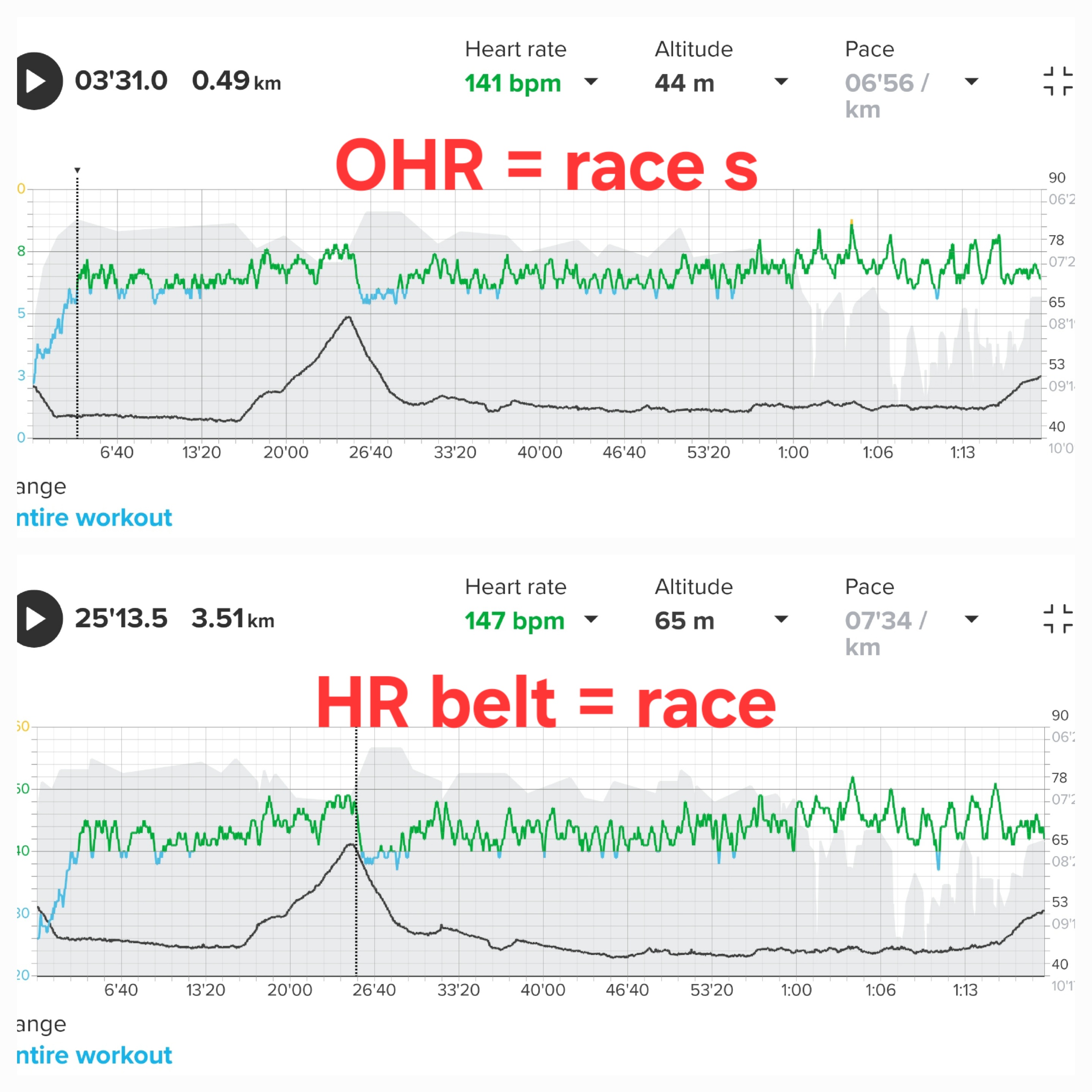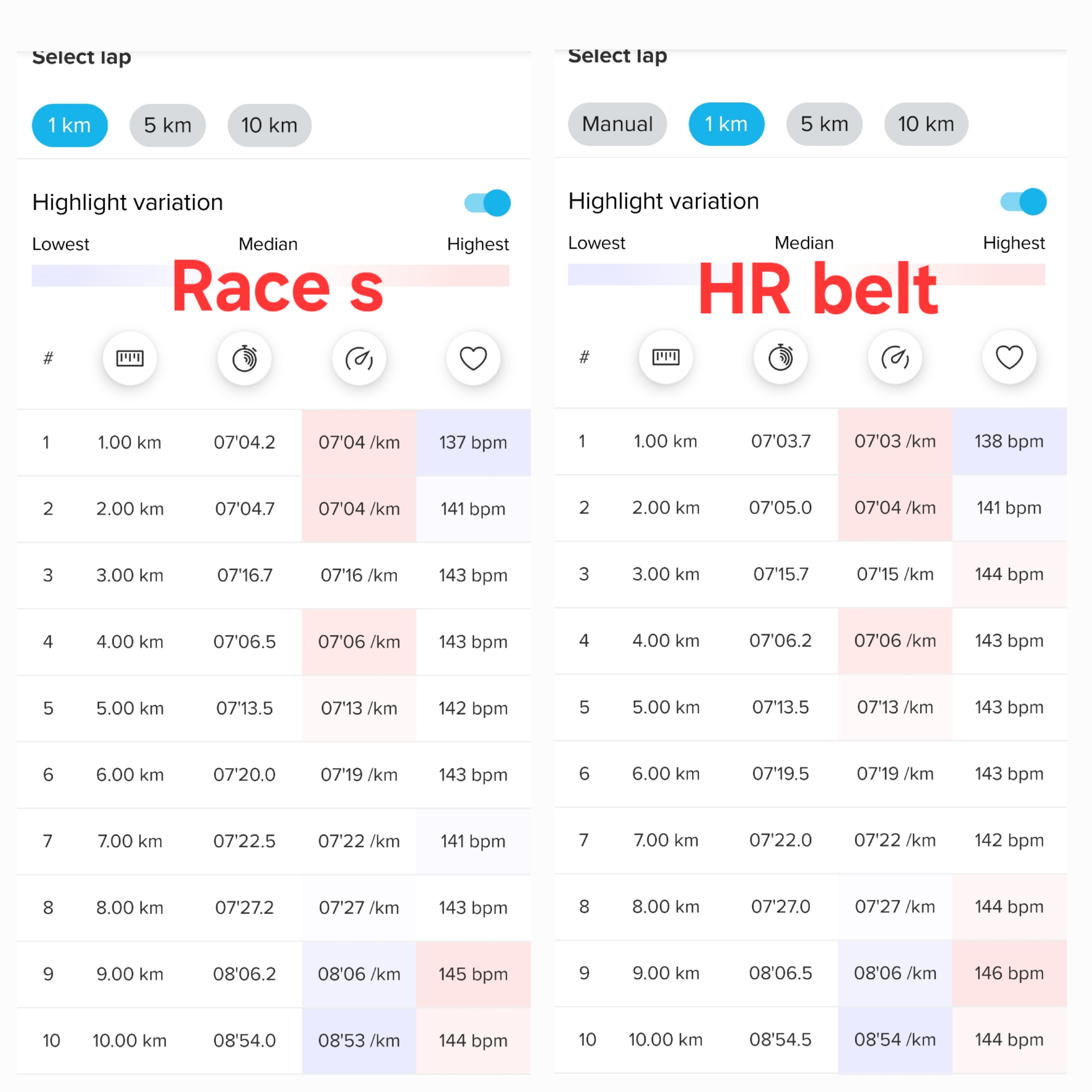HR sensor accuracy
-
I think the fact is that OHR is not reliable for all people and in all circumstances, whereas a chest strap is. One person could use a Garmin with great results and yet be no good with a Suunto or Polar. Someone else could have completely opposite results. The measurement method depends on too many things to be entirely accurate for all people, all of the time for all activities.
For me, Suunto works well, but I still use a chest strap for running and gym activities.
If accuracy matters - and it seems to for most people - buy a chest strap and stop worrying.

-
@2b2bff, sorry, I’ve missed the “Threshold Run” tag.
 Is this true even if you’re using poles (if you have ever tried)?
Is this true even if you’re using poles (if you have ever tried)? -
@2b2bff I disagree. This has absolutely nothing to do with Garmin or the EPIX. You’re lucky because your wrist perfectly fits this model. You’re lucky because your running form is compatible, and you’re lucky because your arm movement isn’t excessive enough to disrupt the measurement.
I invite you to South America, deep in the Amazonian forest, where you have to run through thick brush, cross muddy streams, and then we can talk again about the reliability of wrist-based heart rate measurement. For some individuals, it may work in specific conditions, but certainly not in multisport activities—especially not during intense efforts.
On the other hand, a chest strap provides accurate heart rate measurement in any situation and for all body types, regardless of size, age, or weight. That’s why I’ve explained that wrist-based heart rate tracking is not reliable. It doesn’t work consistently, no matter the brand or model, with only a few morphological exceptions.
-
it’s pretty extensively documented that suunto race (original) was worse OHR than competitors in the same scenarios. both desfit and dc rainmaker reached this conclusion. as it has the same gen sensor as the 9PP, you can assume OP has the same issues.
the race s has a upgraded sensor with better results. if the race (original) and 9PP had decent OHR they wouldn’t have updated the sensor. yes, OHR is limited and never as good as a chest strap, but that doesn’t stop there being bad OHR sensors. stop gaslighting OP…
-
@Ghost agree to disagree.
I didn’t say wrist heart rate is perfect and a chest strap is unneeded und all circumstances. I’m just a bit allergic to the “wrist heart rate will always lie to you and you need a chest strap for anything that is more than a guess” approach. Simply because it is not true. If you are a casual street runner and don’t aim for perfection wrist heart rate might be all you need - if the values suit you.
Sure chest strep will always be more accurate, but also it is more of a hassle when you add a vest or run for longer periods. And it is another device that could fail.
TBH if I ever happen to run in the jungle, I don’t think I wouldn’t care about HR that much…

-
@2b2bff Sure thing. But @AnnaBi said HR was crucial, so I responded: if it is crucial, it shouldn’t be based on casual, approximate data—it should be measured with a chest strap. And I always wear one during sports, to the point that I don’t even notice it anymore, enjoying ZoneSense, running in the jungle or doing jump rope.
-
@dankcushions It’s well-documented that wrist-based optical heart rate (OHR) has limitations, and yes, some sensors perform worse than others. The Suunto Race (original) using the same gen sensor as the 9PP did get criticism for its OHR accuracy, and the Race S upgrading the sensor suggests Suunto recognized the need for improvement. That said, OHR performance also depends on individual factors like wrist physiology, fit, and activity type.
No one’s denying that bad OHR sensors exist, but calling it gaslighting is a stretch. If OP needs reliability, a chest strap remains the best option—no wrist sensor will consistently match it.
-


I tried the OHR Race S and it performed incredibly well. -
No one’s denying that bad OHR sensors exist
@Ghost right, but that’s not what you said:
Wrist-based monitoring is garbage for sports, regardless of the brand.
This has absolutely nothing to do with Garmin or the EPIX. You’re lucky because your wrist perfectly fits this model. You’re lucky because your running form is compatible, and you’re lucky because your arm movement isn’t excessive enough to disrupt the measurement.
because it DOES have a lot to do with the epix, which has a comparably good OHR sensor, giving serviceable results to a higher portion of users than the Suunto 9PP / Race, which has a comparably bad OHR sensor.
-
@dankcushions Thanks for the clarifications. However, I stand by what I said—OHR is garbage for sports across all brands and models, except for a lucky few whose physiology happens to align perfectly with their wearable for somewhat decent approximations. My point was simply in response to someone stating that HR is crucial. If it’s crucial, then you cannot rely on OHR for sports, regardless of the brand or model.